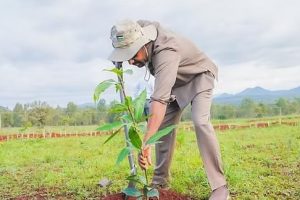BY EPHREM ANDARGACHEW
Agriculture is the mainstay of the Ethiopian economy. This sector controls the growth of all other sectors and consequently, the whole national economy. The sector is dominated by small-scale farmers who practise rain-fed mixed farming by employing traditional technology, adopting a low-input and low-output production system. The land tilled by the Ethiopian small-scale farmer accounts for 95 per cent of the total area under agricultural use, and these farmers are responsible for more than 90 per cent of the total agricultural output.
Welteji, D. (2018) in his academic article “A critical review of rural development policy of Ethiopia: access, utilization and coverage” stated that the agriculture sector of Ethiopia constitutes over 50 per cent of the gross domestic product (GDP), accounts for over 85 per cent of the labour force and earns over 90 per cent of the foreign exchange. Besides, on average, crop production makes up 60 per cent of the sector’s outputs, while livestock accounts for 27 per cent and other areas contribute 13 per cent of the total agricultural value-added.
Agricultural tasks count on the ability of the farmers to maintain productive crops using subsistence farming, leaving them exceptionally dependent on rainfall. Farming processes are highly sensitive and have two grain-growing seasons: “Belg” and “Meher”.
Belg is the shorter season from February to April, and Meher is the main season from May to September. Besides, the main crop season is the Meher season, with harvests between September and February.
The agricultural sector is one of the nation’s most promising resource, nevertheless, it has been challenged by periodic drought, poor infrastructure that often make it hard and expensive to get goods to market, overgrazing, deforestation, and high population density has led to massive soil degradation leading to low productivity.
Apart from the aforementioned challenge, currently, the nation has faced national security threats from both internal and external forces. To reverse the threats, all Ethiopians regardless of age, gender, educational background, status, and so on have joined the Joint Security Forces under Ethiopian National Defense Forces (ENDF), Amhara Special Forces, Fano, and the local militia.
Apart from Ethiopian National Defense Forces, people from irregular forces have also joined the campaign fighting against terrorist TPLF. Because the war needs an all-rounded kind of participation from all Ethiopian people. When these people join the security forces, by putting their country sovereignty, territorial integrity, and respect for national security priority, they haven’t harvested the crops they sowed.
Cognizant of this, framers, people from different professions, workers of civil servants, and so on have been participating in harvesting families of the soldiers.
Ethiopian Ministry of Education has also decided to close education for a while and a decision was made to harvest the crops of members of Ethiopian Security Forces who are participating in the campaign against terrorist TPLF.
According to Ethiopian Ministry of Education Minster Prof. Berhanu Nega, secondary education will be closed from December 06 to December 03, 2021, to support those people who are participating in the war against TPLF terrorist group. It has been decided that teachers and students will play their national role in harvesting the crops.
Apart from supporting families of soldiers, teachers and students are also expected to perform various activities such as preparation of food, contributing to financing, and donating blood to the Joint Security Forces. He also called on them to provide various assistance and take part in rebuilding the war-torn areas.
Ethiopian Ministry of Agriculture State Minister Dr Meles Mekonnen in his part noted that the Joint task forces including Ethiopian National Defense Forces, by putting the respect of the national security and territorial integrity of their country as the number one priority, are sacrificing their lives without reaping the harvest. Hence, it is important to harvest in this season.
Members of the TPLF terrorist invaders have created critical catastrophes in the Amhara and Afar regional states. Hence, it is necessary to work to compensate for the crop damage caused by the invader in Amhara and Afar regions, He further said.
North Gondar Zone, Jana Mora Woreda Framers Ato Aleliny Gelaw told local media that “we have been doing various farming tasks for the families of the soldiers since June. Currently, we are also harvesting the families of the soldiers. This will not only support the families of the militants but also help to prevent waste of products.
Another participant of Jana Mora Woreda, Gira Geta Fiseha Chakil said that “while the Joint Security Forces are making sacrifices to their country, we, the people of Ethiopia, are also committed to extending our support to families of soldiers. Following reaping the harvest, we are also planning to do crop mowing.”
Following the call of the Ethiopian Ministry of Education, a parade is being held for 30,000 teachers and students in the Capital.
According to Addis Ababa City Administration Mayor Adanech Abiebie, about 30,000 teachers and students in the capital have been sent to various parts of the country to help harvest the families of soldiers.
Apart from showing our togetherness to our heroic army and their families that are giving their life on different occasions and events, teachers and students’ participation in crop harvesting for families of soldiers will help for food self-sufficiency. “Because Ethiopia is being built by the united arms of its children, not by begging,” she said.
The Ethiopian Herald December 7/2021





